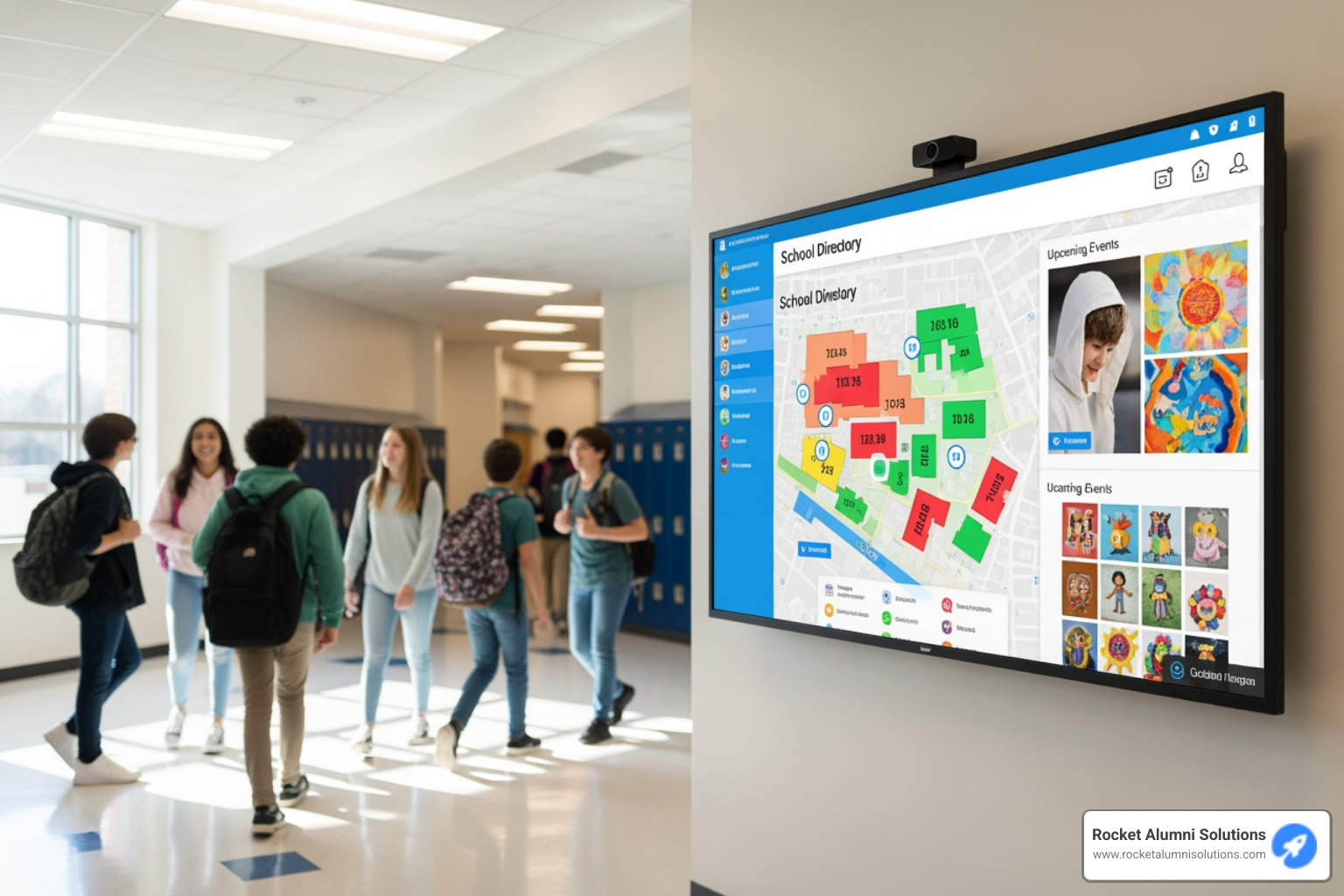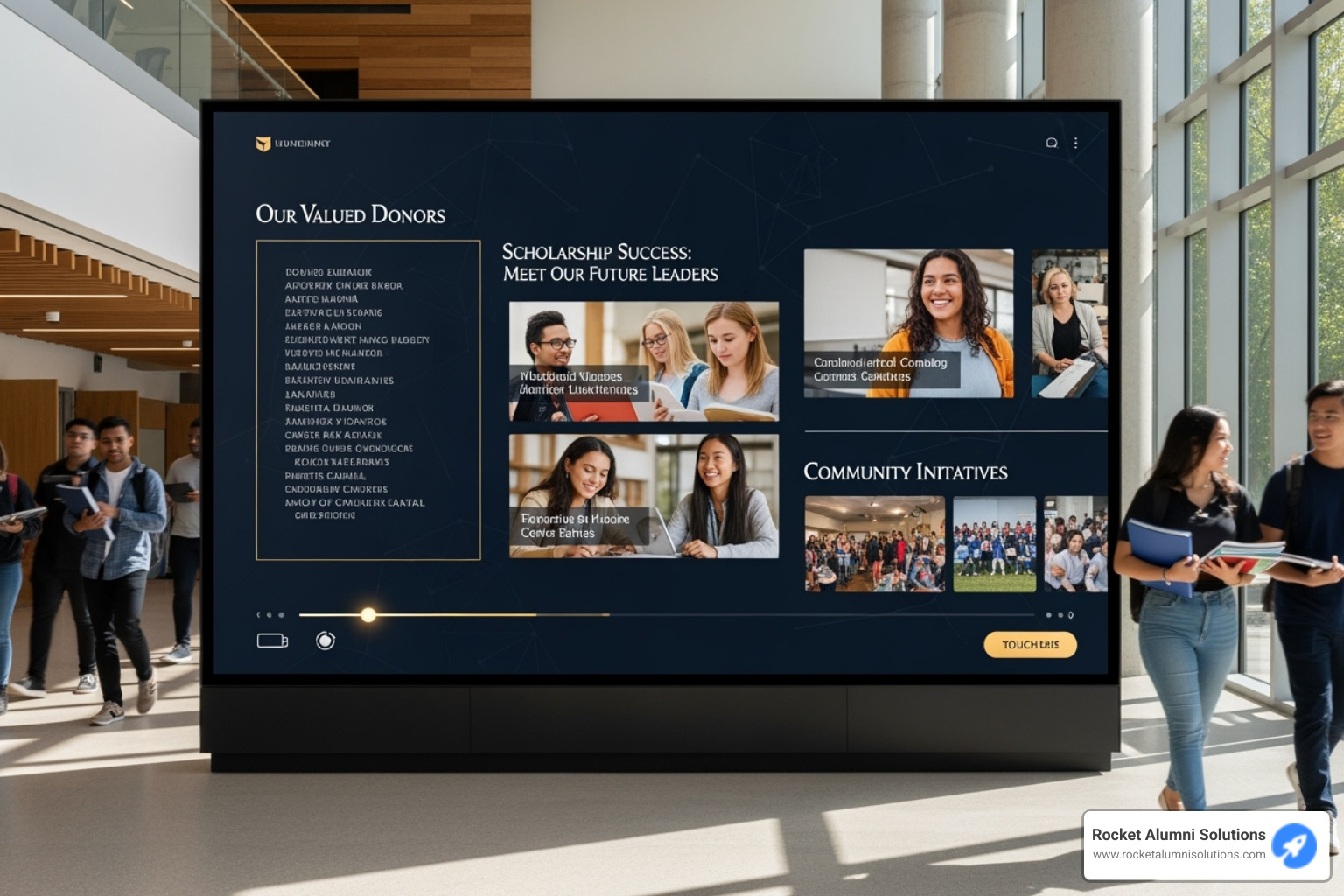Why Elementary School Superlatives Create Powerful Recognition Moments
Elementary school superlatives are special awards celebrating the unique qualities of young students—from "Kindness Champion" to "Future Scientist." These awards create lasting memories, boost confidence, and foster a strong sense of community.
Quick Guide to Creating Elementary School Superlatives:
- Focus on character and effort over appearance or popularity.
- Make awards specific and personal, like "Ray of Sunshine" or "Super Sleuth."
- Ensure every child receives recognition for their unique qualities.
- Involve students through positive peer feedback, not direct voting.
- Present awards meaningfully during end-of-year celebrations.
Research shows that student awards offer immediate and long-term benefits. They boost confidence and motivation, which can lead to a lifelong love of learning and stronger leadership qualities. When children see their unique contributions recognized—whether as a "Kindness Champion" or "Future Inventor"—they understand that their efforts matter.
The most impactful superlatives are specific. Instead of a generic "Good Student" award, titles like "Master Question Asker" or "Future Scientist" feel more personal and meaningful.
I'm Chase McKee, founder and CEO of Rocket Alumni Solutions. We've helped hundreds of schools create meaningful recognition programs with interactive displays and digital yearbooks. I've seen how thoughtfully designed elementary school superlatives can transform classroom culture and create positive memories for young learners.
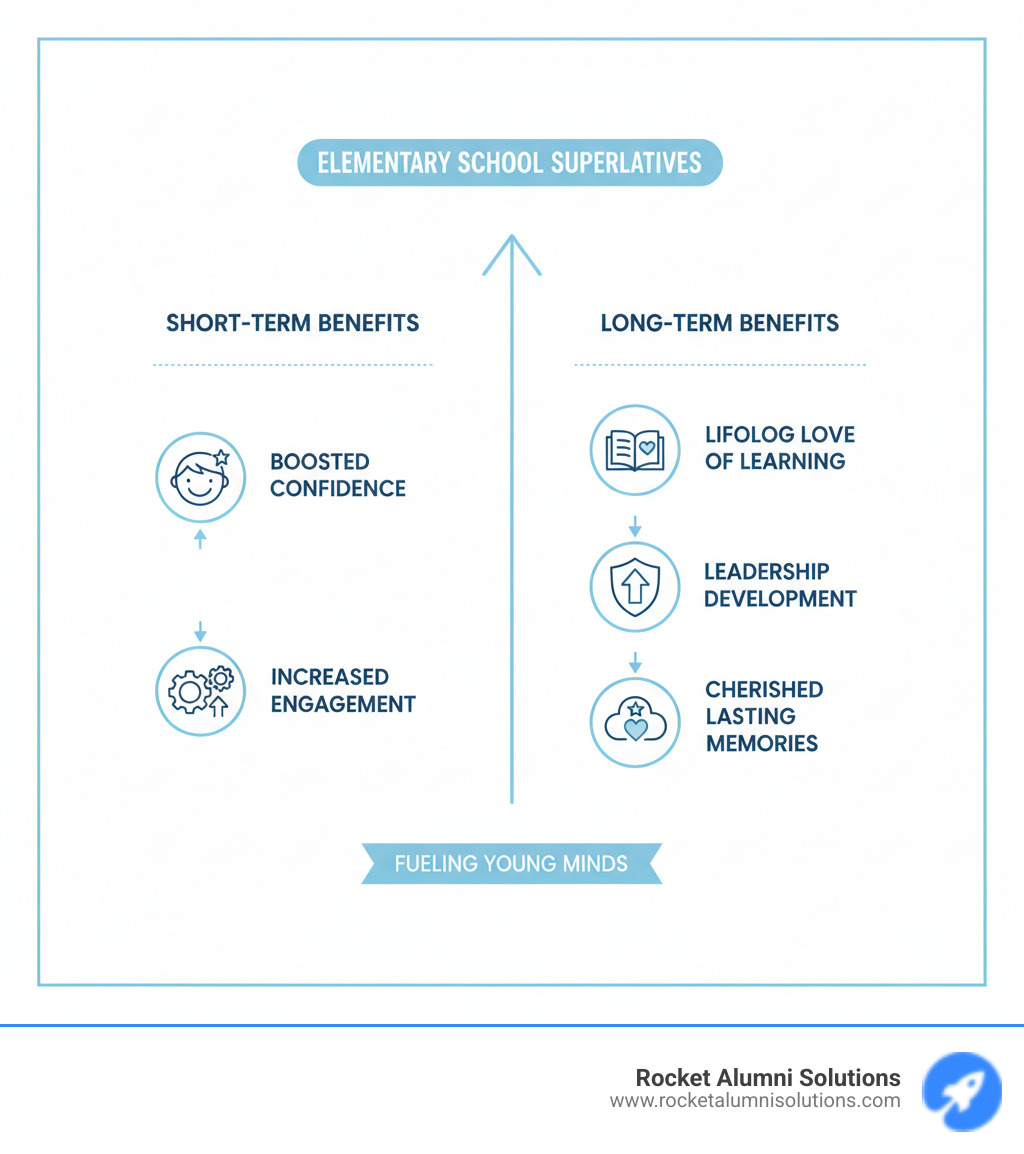
Elementary school superlatives are more than just certificates; they are powerful moments that shape how young learners see themselves. Unlike high school awards that may focus on popularity, elementary superlatives are designed to celebrate character, effort, and the unique spark in each child. Recognizing a student as a "Kindness Champion" or "Best Helper" reinforces positive behavior and builds self-esteem.
This recognition directly boosts confidence and motivation. When students see their individual strengths celebrated, they become more engaged in their learning. These early moments of validation also foster a sense of belonging, as students learn to appreciate the diverse talents within their classroom. This creates a community where every child feels they have something meaningful to contribute.
The Unique Power of Recognition for Young Learners
For young children, who are still developing their sense of self, personal recognition is incredibly impactful. It's not about competition but about making each child feel seen and understood. A shy student awarded "Best Listener" learns that their quiet nature is a strength. A student who struggles with a subject but is named "Most Determined Problem Solver" sees their effort valued above their grade.
These specific acknowledgments highlight growth and character, promoting inclusivity by celebrating a wide range of traits. The math whiz is recognized, but so is the student who makes others laugh or helps a classmate. This approach helps create a classroom culture where students feel secure enough to take risks and collaborate.
Moving Beyond "Most Popular": The Elementary Difference
Elementary superlatives must avoid the pitfalls of popularity contests. The focus should be on kindness, effort, and unique talents, not appearance or social status. The goal is to create awards that are specific and personal, capturing something genuine about each child. A title like "Ray of Sunshine" resonates more deeply than a generic one.
This requires avoiding categories that could cause hurt feelings or unhealthy comparisons, such as "Most Athletic" or "Smartest Student." Instead, specific abilities can be celebrated with titles like "Math Master" or "Word Wizard." By thoughtfully recognizing quiet helpers, creative thinkers, and kind friends, we ensure every child receives a fitting award that reflects who they are. This approach turns superlatives into a tool for building a classroom where every student feels valued and included.
100+ Ideas for Inclusive Elementary School Superlatives
Creating meaningful elementary school superlatives means celebrating every student's unique strengths. We've gathered a comprehensive list of ideas that go beyond academics to recognize character, creativity, and humor. The goal is simple: every child deserves to feel seen and celebrated.
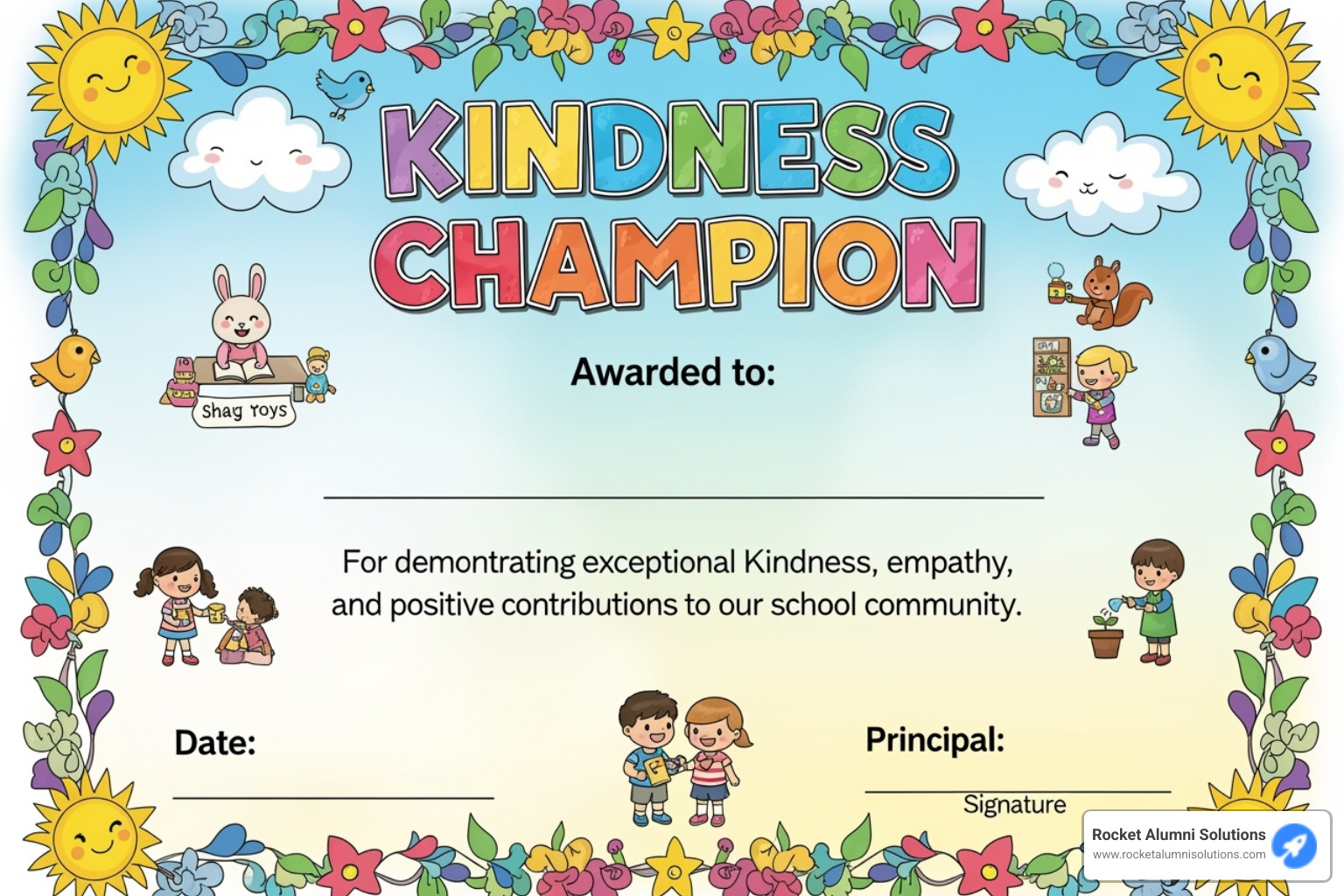
We've organized these ideas into four categories to help you find the perfect fit for each student. As you read, think about the quiet acts of kindness, learning breakthroughs, and creative surprises that made your classroom special this year.
Academic and Growth-Mindset Superlatives
These awards celebrate intellectual curiosity, the joy of learning, and the determination to grow.
- Math Master: Loves solving problems and sees numbers as fun puzzles.
- Word Wizard: Devours books and has a knack for language.
- Science Whiz: Asks endless "what if" questions during experiments.
- Most Improved Reader: Celebrates a student who worked hard to build their skills.
- Super Speller: Consistently masters tricky words.
- History Buff: Loves sharing fascinating facts about the past.
- Best Question Asker: Helps everyone think more deeply.
- Most Determined Problem Solver: Never gives up on a tough challenge.
- Future Teacher: Naturally helps classmates understand new concepts.
- Awesome Author: Crafts stories that captivate the class.
- Curiosity King or Queen: Always wants to know the "why" and "how."
- Logical Thinker: Excels at puzzles and seeing connections.
- Research Rockstar: Loves digging for information.
- Technology Explorer: Eagerly learns new digital tools.
- Pattern Pro: Spots connections and patterns everywhere.
Character-Based Elementary School Superlatives
These awards highlight the social and emotional strengths that create a caring, respectful classroom community.
- Kindness Champion: Quietly offers comfort and makes compassion look easy.
- Ray of Sunshine: Lifts everyone's mood with contagious positive energy.
- Best Helper: Is always ready to lend a hand without being asked.
- Friendship Expert: Ensures no one feels left out and helps peers resolve disagreements.
- Heart of Gold Award: Shows remarkable empathy and genuinely cares for others.
- Most Responsible: Follows classroom rules and routines without reminders.
- Best Listener: Gives their full attention and remembers what others share.
- Team Player: Excels at collaboration and encourages others.
- Most Honest: Tells the truth, even when it's difficult.
- Peaceful Problem Solver: Resolves conflicts calmly and fairly.
- Courageous Kid: Bravely tries new things or stands up for what's right.
- Respectful Role Model: Consistently treats everyone and everything with care.
- Enthusiasm Extraordinaire: Brings excitement to every activity.
- Positive Pal: Always sees the best in situations and people.
- Thoughtful Teammate: Considers others' feelings in group settings.
Creative & Artistic Superlatives
These awards celebrate imagination, artistic expression, and innovative thinking.
- Amazing Artist: Transforms simple art supplies into masterpieces.
- Master Builder: Creates incredible structures with blocks or Legos.
- Best Storyteller: Captivates the class with vivid narratives.
- Singing Superstar: Brightens music time with their love for melody.
- Dazzling Dancer: Expresses themself through movement and rhythm.
- Future Movie Director: Turns writing assignments into detailed screenplays.
- Most Imaginative: Brings unique ideas to every project.
- Tech Guru: Patiently helps others with tablets, computers, or code.
- Creative Crafter: Excels at hands-on projects.
- Inventive Innovator: Suggests new ways to approach problems.
- Dramatic Dynamo: Brings characters to life during read-alouds.
- Melody Maker: Shows natural musical talent.
- Design Whiz: Has a great eye for aesthetics and layout.
- Digital Dreamer: Creates impressive digital art, stories, or presentations.
Funny and Unique Elementary School Superlatives
These lighthearted awards celebrate the humor and individual personalities that make your classroom a joyful place.
- Classroom Comedian: Knows how to get a laugh without being disruptive.
- Super Sleuth: Has a knack for finding lost items.
- Future Inventor: Comes up with creative and surprising solutions to problems.
- Best Laugh: Has a contagious giggle that makes everyone smile.
- Master of Puns: Always has clever wordplay ready.
- Most Energetic: Brings infectious enthusiasm to every activity.
- Silliest Joke Teller: Knows just when the class needs a smile.
- Human Encyclopedia: Loves sharing interesting facts.
- Most Likely to Brighten Your Day: Spreads positivity wherever they go.
- Night Owl Award: Stays energetic, even in the afternoon.
- Master of the Mismatched Socks: Celebrates their unique style.
- Best at Confusing Technology with Magic: Has a special way with gadgets.
- Most Likely to Win a Staring Contest: Has incredible focus.
- Chief Snack Officer: Is always prepared with the best snacks to share.
How to Create and Award Meaningful Superlatives
Creating and awarding elementary school superlatives is about crafting moments of genuine recognition that build confidence. The magic happens when we make every award personal and inclusive, ensuring each child feels celebrated for who they are.
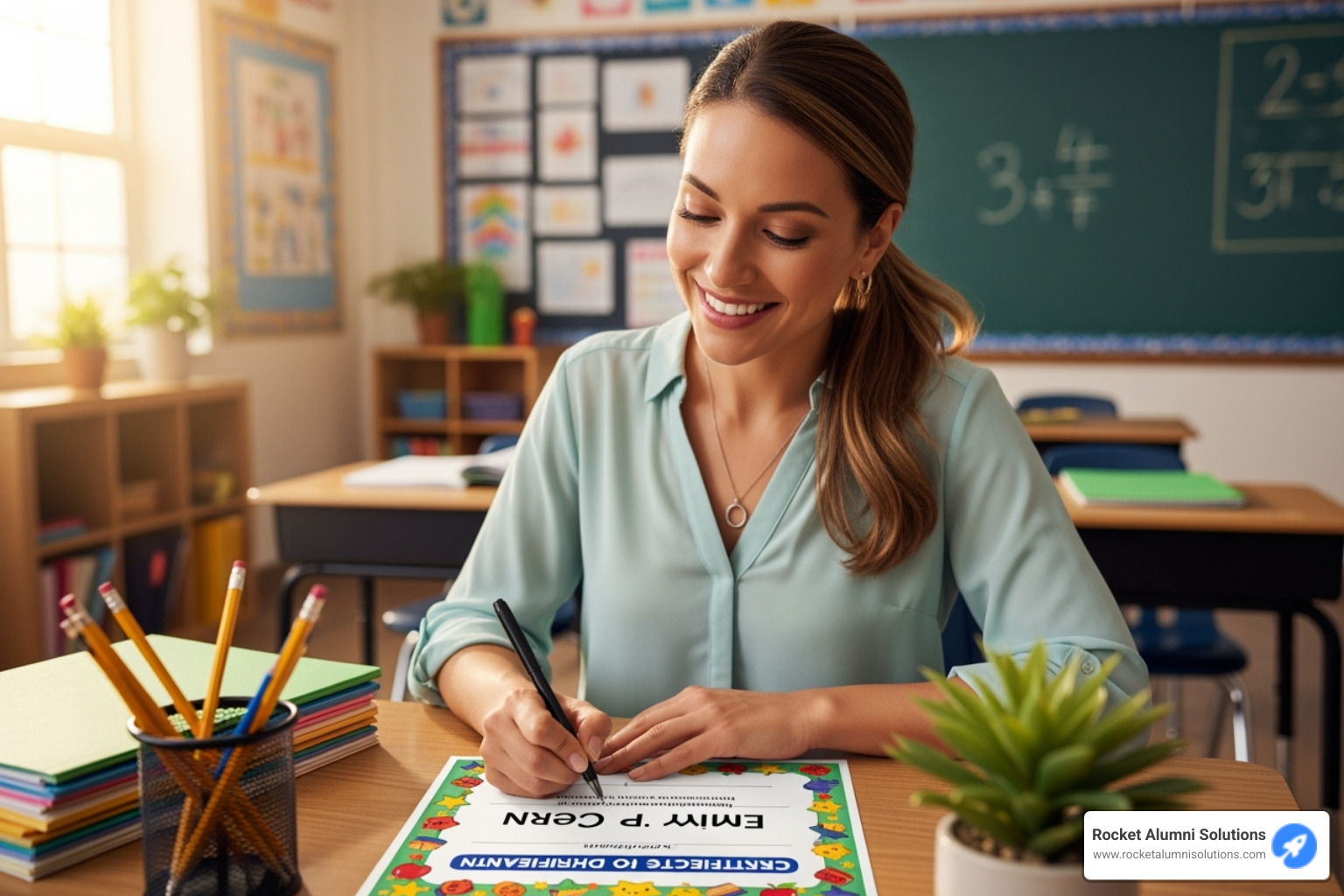
The Teacher's Role: Observation and Selection
As a teacher, you witness the small moments that define each child's character. You see the quiet helper, the thoughtful question-asker, and the comforting friend. These daily observations are the foundation of meaningful superlatives.
Throughout the year, keep a notebook to jot down these moments—when a student showed kindness, persevered through a challenge, or brought joy to the classroom. This record helps ensure that awards are based on the full story of each child's growth. The key is specificity. Instead of a generic "Good Student" award, a child who asks insightful questions becomes the "Master Question Asker." This thoughtful approach ensures every child receives a unique award that feels authentic.
Involving Students the Right Way
Involving students can add great insight, but it must be handled carefully to avoid turning it into a popularity contest. Direct voting can be hurtful, so focus on collaborative activities that celebrate everyone.
One effective method is to have each student write one positive comment about every classmate, using prompts like, "Something I appreciate about..." This gives you a window into how students see each other and reveals strengths you might have missed. This process can also become a learning opportunity for grammar, teaching superlative adjectives like "kindest" or "most creative" in a real-world context.
Crucially, the teacher makes the final decisions. By combining peer insights with your own observations, you can assign awards that are fair, inclusive, and fitting for every child. This balanced approach turns superlatives into a celebration of community rather than a contest.
Creative Ways to Present and Preserve Your Awards
The moment a child receives their superlative is a memory in the making. Combining traditional presentation methods with modern technology can create an unforgettable experience for students and their families.
Traditional Touches for Lasting Memories
End-of-year award ceremonies, whether a school assembly or an intimate classroom party, are a wonderful platform for celebrating students. Reading each award aloud with a personal anecdote makes the moment more meaningful. Printable certificates offer a tangible keepsake, and class memory books can preserve each student's superlative alongside photos from the year. Involving parents in these celebrations strengthens the home-school connection and reinforces the value of the recognition.
Modernizing Memories with Technology
Technology offers exciting ways to improve the presentation and preservation of elementary school superlatives. Digital yearbooks, for example, can feature student photos and their unique superlatives in a vibrant, interactive format.
Our Rocket Alumni Solutions platform allows schools to create dynamic digital yearbooks and animated flip books that are accessible from anywhere. With social media and mobile integration, families can easily view and share these special recognitions. Interactive touchscreen displays in school hallways can also serve as a digital "Hall of Fame," allowing students and visitors to browse the year's superlatives. This approach keeps the spirit of recognition alive long after the ceremony ends, ensuring these moments of pride are never forgotten.
Frequently Asked Questions about Elementary School Superlatives
Creating meaningful elementary school superlatives can raise important questions. Here are answers to the most common concerns.
How can I involve students without it becoming a popularity contest?
The key is to avoid direct voting. Instead, use collaborative activities. Have students brainstorm positive qualities or write one kind thing about every classmate. This provides you with valuable insights. You, the teacher, then use this input along with your own observations to assign the final awards. This ensures fairness and inclusivity, making it a celebration of character, not popularity.
What's the difference between classic and unique superlatives for this age group?
Classic superlatives like "Class Clown" can sometimes be misinterpreted. Unique superlatives like "Ray of Sunshine" or "Super Sleuth" are often more meaningful because they are specific, personal, and celebrate character. A good strategy is to use a mix, adapting classic titles to be positive and inclusive (e.g., "Classroom Comedian" instead of "Class Clown"). The more personal the award, the more it will resonate.
When is the best time to give out class superlatives?
The end of the school year is the most popular time, offering a great sense of closure. However, superlatives don't have to be a once-a-year event. Some teachers give them out quarterly to recognize ongoing growth or even spontaneously after a big project to maintain motivation. The best time is whenever it feels most meaningful for your classroom. You can even turn it into an interactive learning opportunity for grammar at any point in the year.
Conclusion
Elementary school superlatives are more than just awards; they are powerful tools that shape how young learners see themselves. By celebrating diverse strengths—from the quiet helper to the enthusiastic question-asker—we build a classroom community where every child feels they belong. These moments of recognition boost confidence, foster a positive environment, and create cherished memories that last a lifetime.
Creating these moments requires thoughtful observation and a commitment to celebrating every child. It means presenting awards in a way that feels special, whether through a heartfelt ceremony or modern digital displays that preserve the memories.
At Rocket Alumni Solutions, we help schools celebrate student achievements in engaging, accessible ways. Our digital solutions transform traditional elementary school superlatives into interactive experiences that the entire school community can enjoy. From animated flip books to digital yearbooks, we make it easy to preserve and share these important recognitions.
When we make every child feel seen and valued, we're not just handing out awards—we're building a foundation for future success.
Take your student recognition to the next level with interactive superlatives and find how our platform can help you celebrate every student's unique spark.

















































































































